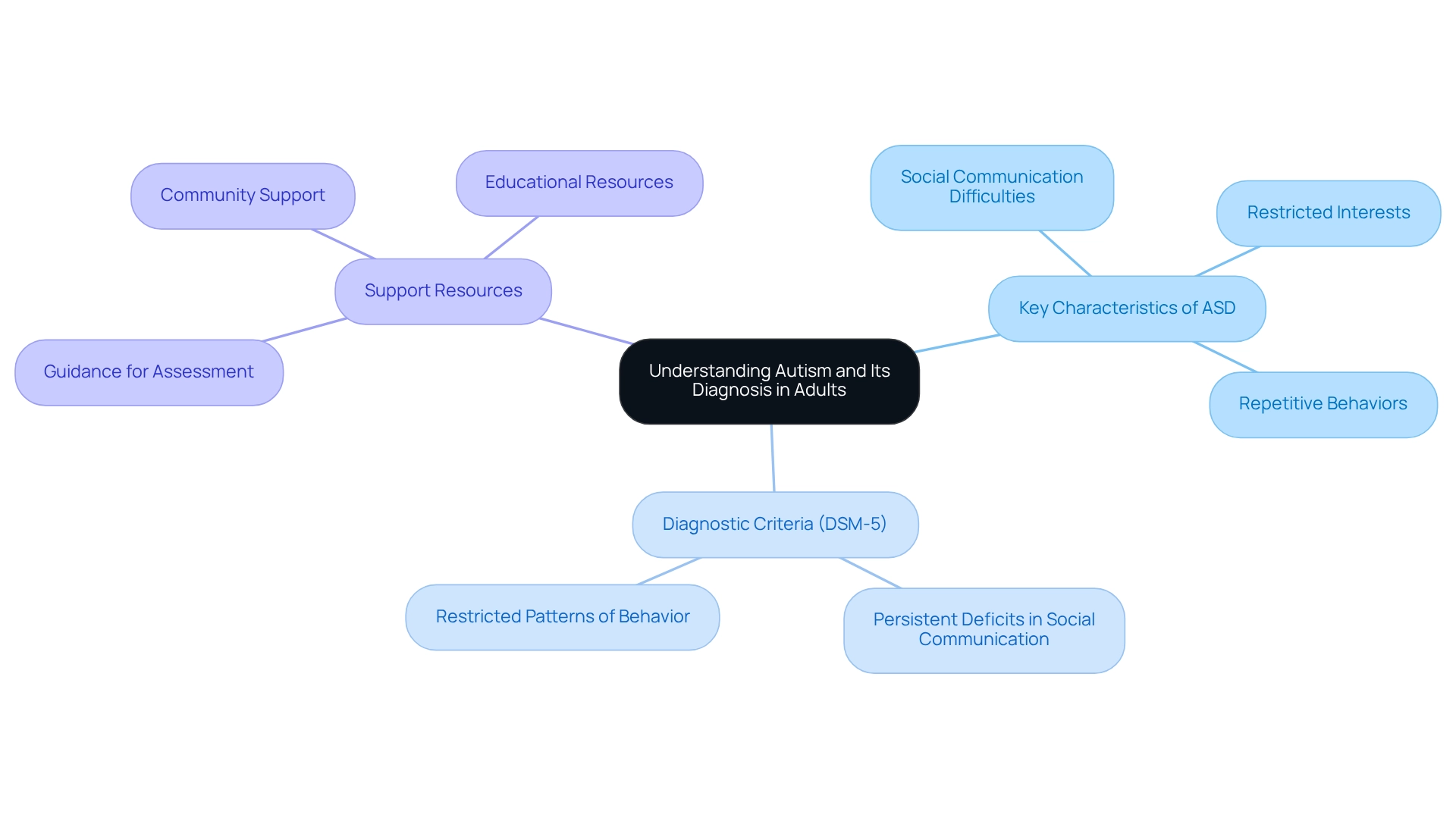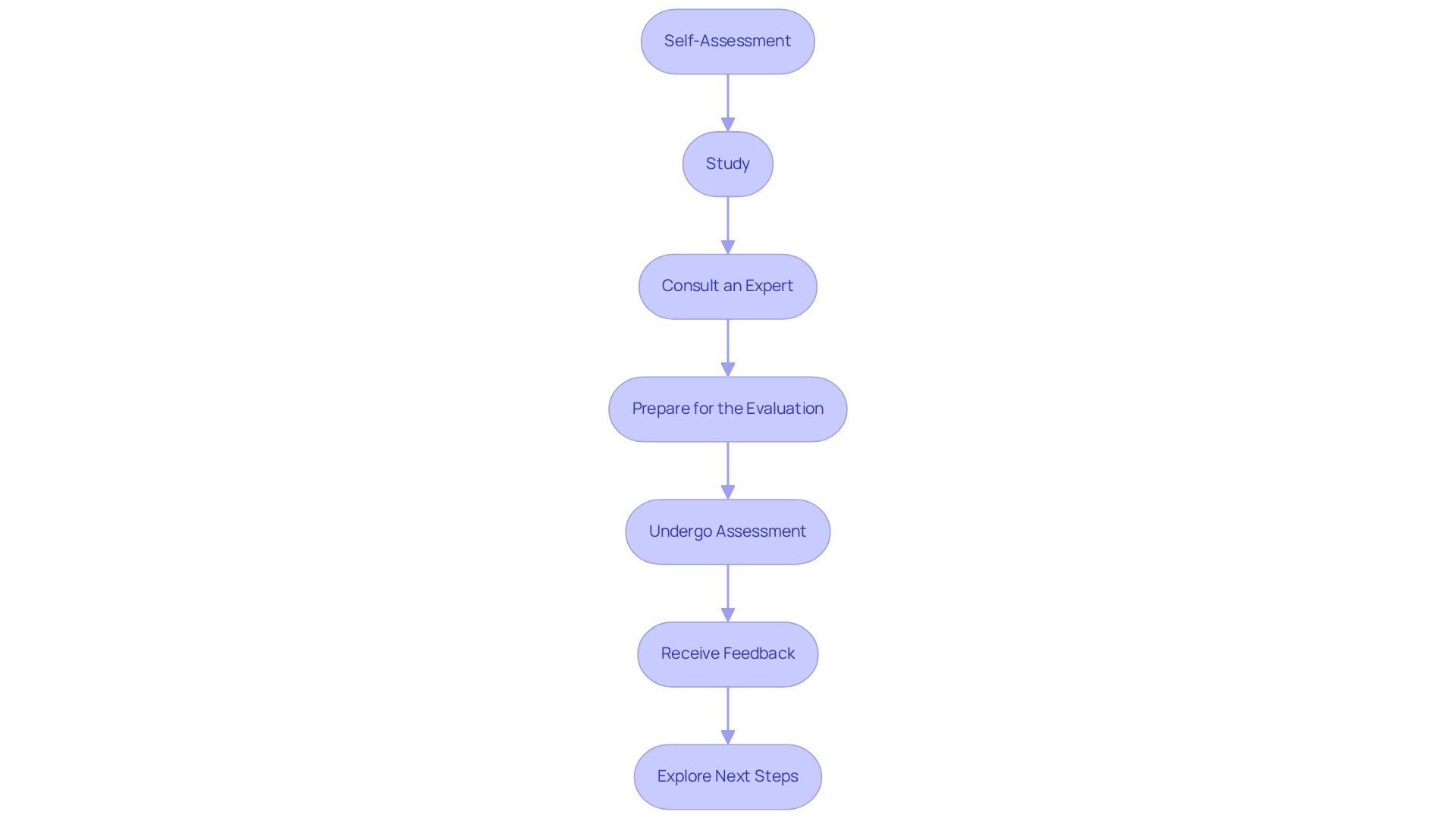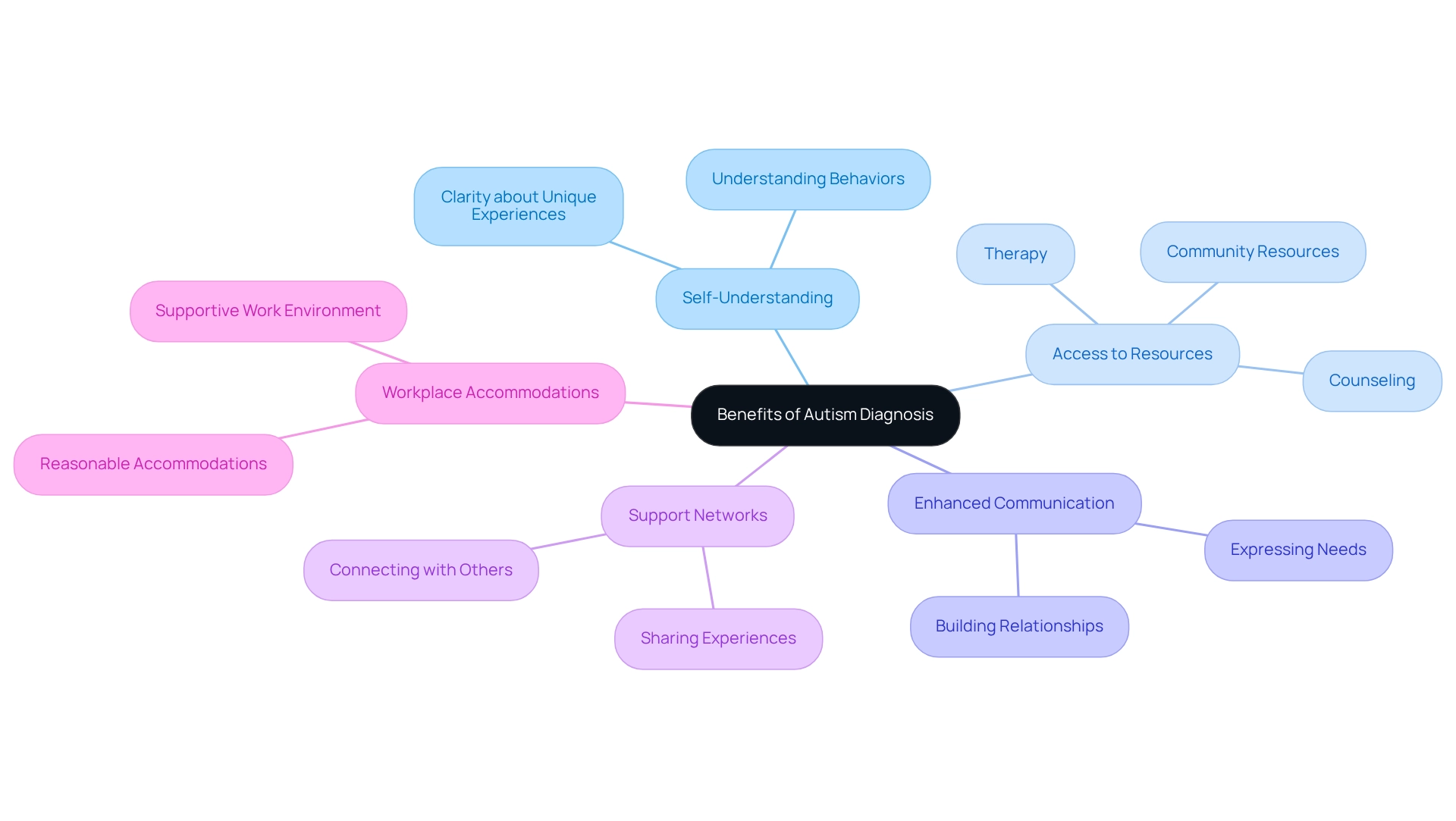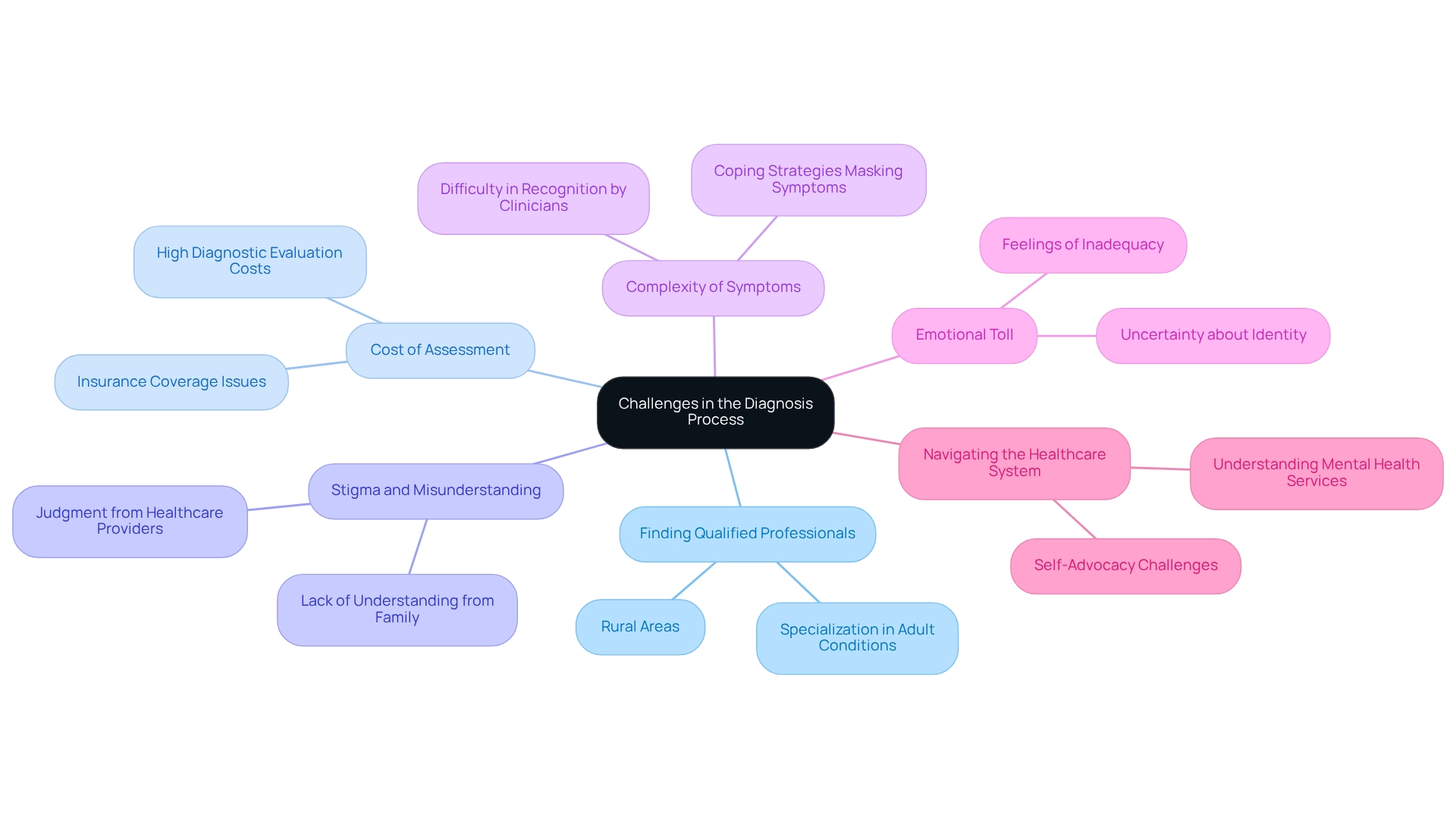Overview
It's important to know that adults can be diagnosed with autism, though the journey can be intricate. Factors such as developed coping strategies might mask symptoms, and the specific criteria set out in the DSM-5 can add to the complexity. Understanding these criteria is crucial.
By following a structured approach—starting with self-assessment and leading to a thorough evaluation—individuals can feel empowered to pursue a diagnosis. This not only opens the door to understanding themselves better but also provides access to valuable resources for support.
If you or someone you know is navigating this path, remember, you're not alone. Seeking help is a courageous step towards finding the support you need.
Introduction
In a world where the nuances of neurodevelopmental conditions often go unnoticed, understanding Autism Spectrum Disorder (ASD) in adults is crucial for fostering awareness and empathy. Many adults may have developed coping mechanisms that obscure their symptoms, which can complicate diagnosis. By recognizing the key characteristics of autism—such as challenges in social communication and restrictive interests—we can help individuals seek the clarity and support they need.
This article delves into the diagnostic process, highlighting essential steps for pursuing an autism diagnosis, the myriad benefits it can bring, and the challenges that may arise along the way. By shedding light on these aspects, we aim to empower adults navigating their experiences on the spectrum.
Understand Autism and Its Diagnosis in Adults
Autism Spectrum Disorder (ASD) is a neurodevelopmental condition that profoundly influences how individuals perceive and interact with the world around them. For many parents and caregivers, the question of whether adults can be diagnosed with autism can feel overwhelming. Unlike children, adults may have developed coping strategies that mask their symptoms, making diagnosis a more complex journey. Key characteristics of ASD in adults, such as difficulties in social communication, restricted interests, and repetitive behaviors, raise important questions about diagnosis. Understanding these traits is vital for recognizing whether adults can indeed be diagnosed with autism.
The DSM-5 outlines specific criteria for diagnosing ASD, which includes persistent deficits in social communication and interaction, as well as restricted, repetitive patterns of behavior. Familiarizing yourself with these criteria can empower you to determine if seeking an assessment is the right step for you or your loved one. If you find yourself resonating with these challenges, know that you are not alone. Many families face similar uncertainties, and there are resources available to support you through this process. Consider reaching out for guidance, as understanding ASD can lead to a brighter path forward.

Follow the Steps to Pursue an Autism Diagnosis
Pursuing an autism diagnosis as an adult can be a significant journey, and it's important to approach it with care and understanding. Here’s a supportive guide to help you through the process:
-
Self-Assessment: Start by reflecting on your experiences and symptoms. Keeping a journal of your behaviors and emotions can be a helpful way to identify traits that align with autism spectrum conditions.
-
Study: Take some time to familiarize yourself with the diagnostic criteria for autism spectrum conditions. Resources like the DSM-5 can offer valuable insights into what professionals look for during assessments.
-
Consult an Expert: It’s crucial to understand how adults can be diagnosed with autism. Arrange a meeting with a healthcare provider skilled in assessments for adults on the spectrum, such as a psychiatrist, psychologist, or a specialized clinic.
-
Prepare for the Evaluation: Gather information about your developmental history, including childhood behaviors and any past assessments. Bringing notes on your current challenges and their impact on your daily life can be very beneficial.
-
Undergo Assessment: Be prepared for a comprehensive evaluation that may involve interviews, questionnaires, and possibly standardized tests. This process may take multiple sessions, so give yourself grace during this time.
-
Receive Feedback: After the evaluation, the clinician will review the results with you. They will discuss whether you meet the criteria for the condition, providing clarity and support.
-
Explore Next Steps: If you receive a diagnosis, take the time to discuss potential therapies, support groups, and resources that can assist you in managing your condition. Remember, you are not alone in this journey, and there are many avenues for support available to you.

Explore the Benefits of an Autism Diagnosis
Receiving an autism diagnosis as an adult can offer numerous benefits that may transform your understanding of yourself and your experiences.
-
Self-Understanding: Imagine gaining clarity about your unique experiences and behaviors—this assessment can illuminate aspects of yourself that you may have struggled to comprehend.
-
Access to Resources: With an official diagnosis, you unlock the door to various support services, including therapy, counseling, and community resources specifically designed for autistic individuals.
-
Enhanced Communication: Understanding your condition can significantly improve your ability to express your needs to others, fostering stronger, more meaningful relationships.
-
Support Networks: A diagnosis can connect you with supportive groups and communities where you can share your experiences and learn strategies from others who truly understand the challenges you face.
-
Workplace Accommodations: Many employers are required to provide reasonable accommodations for individuals with a diagnosis, creating a more supportive work environment tailored to your needs.
Additionally, mental health support is crucial, as it raises important questions about how adults can be diagnosed with autism. It also enhances access to services that address co-occurring conditions like anxiety or depression, which are often prevalent among autistic individuals.
This journey of understanding and support is not just about a diagnosis—it's about embracing who you are and seeking the resources that can help you thrive.

Identify Challenges in the Diagnosis Process
Pursuing an autism diagnosis can indeed be beneficial, but it's important to recognize that several challenges may arise along the way.
Finding a qualified professional can be a daunting task, especially for adults. This is particularly true in rural areas where clinicians specializing in adult conditions may be scarce. The journey to diagnosis often begins with the right support.
Additionally, the cost of assessment can be a significant barrier. Diagnostic evaluations can be expensive, and it's disheartening to note that not all insurance plans cover these crucial services. This financial strain can discourage individuals from seeking the help they need.
Moreover, stigma and misunderstanding can further complicate the process. Some individuals may encounter judgment or a lack of understanding from healthcare providers or even family members. This can create an emotional hurdle, making it harder to reach out for support.
The complexity of symptoms also plays a role. Many adults develop coping strategies that effectively mask their symptoms, which can make it challenging for clinicians to recognize autism during assessments. This often leads to feelings of frustration and confusion.
The emotional toll of this journey cannot be overlooked. Confronting long-standing feelings of inadequacy or uncertainty about one's identity can be incredibly taxing. It's essential to acknowledge these feelings and seek support through this process.
Lastly, navigating the healthcare system can feel overwhelming. Understanding how to advocate for oneself, especially for those unfamiliar with mental health services, can be a daunting task. It's important to remember that you are not alone in this journey; support is available, and there are resources to help guide you through these challenges.

Conclusion
Understanding Autism Spectrum Disorder (ASD) in adults is vital for nurturing empathy and support within our communities. The diagnostic journey, despite its complexities, plays a crucial role for many individuals seeking clarity about their experiences. This article has highlighted the key characteristics of autism, the essential steps to pursue a diagnosis, and the significant benefits that can arise from obtaining one.
Navigating the diagnostic process—from self-assessment to professional evaluation—can empower individuals to gain a deeper understanding of themselves and access valuable resources. Yet, it is essential to recognize the potential challenges, such as finding qualified professionals and overcoming stigma, which can complicate this journey.
Ultimately, raising awareness about autism in adults not only fosters understanding but also cultivates a supportive environment where individuals on the spectrum can flourish. By promoting empathy and providing the necessary tools and resources, we can help those with autism lead fulfilling lives and embrace their unique perspectives. Together, let us commit to creating a more inclusive society where everyone is valued and understood.
Frequently Asked Questions
What is Autism Spectrum Disorder (ASD)?
Autism Spectrum Disorder (ASD) is a neurodevelopmental condition that significantly affects how individuals perceive and interact with their environment.
Can adults be diagnosed with autism?
Yes, adults can be diagnosed with autism, but the process can be more complex due to the coping strategies they may have developed that mask their symptoms.
What are the key characteristics of ASD in adults?
Key characteristics of ASD in adults include difficulties in social communication, restricted interests, and repetitive behaviors.
What criteria does the DSM-5 outline for diagnosing ASD?
The DSM-5 outlines criteria that include persistent deficits in social communication and interaction, as well as restricted and repetitive patterns of behavior.
How can understanding the traits of ASD help individuals?
Familiarizing oneself with the traits of ASD can help individuals determine if seeking an assessment is the right step for themselves or their loved ones.
What should individuals do if they resonate with the challenges of ASD?
Individuals who resonate with these challenges are encouraged to seek guidance and support, as understanding ASD can lead to a more positive path forward.




